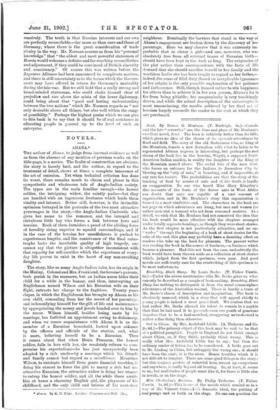NOVELS.
AHANA.*
THE author of Ahana, to judge from internal evidence as well as from the absence of any mention of previous works on the title-page, is a novice. The faults of construction are obvious; the story is loosely knit, and the author, in regard to the treatment of detail, shows at times a complete innocence of the art of omission. Yet when technical criticism has done its worst, there remains much to cliarm and please in this sympathetic and wholesome tale of Anglo-Indian society. The types are ihi the main familiar enough—the honest soldier, the intriguing widow, the saintly padre—but they are handled with an ingenuous freshness which lends them vitality and interest. Better still, however, is the invincible optimism betrayed in the portraits of the two most attractive personages in the story,—the Anglo-Indian Cinderella who gives her name to the romance, and the intrepid and chivalrous little boy who forms a link between hero and heroine. Each of them furnishes a proof of the abiding force of heredity rising superior to squalid surroundings, and if in the case of the heroine her unselfishness is pushed to superhuman lengths, and the contrivance of the final catas- trophe lacks the inevitable quality of high tragedy, one cannot say that the picture is altogether inconsistent with that capacity for self-sacrifice which the experience of every- day life proves to exist in the heart of any non-revolting daughter.
• The story, like so many Anglo-Indian tales, has its origin in the Mutiny. Colonel and Mrs. Frankland, the heroine's parents, both perish in the massacre, but an Indian nurse hides their child for a while in the bazaar, and then, intercepting an Englishman named Wilson and his Eurasian wife on their flight, entrusts her charge to the fugitives. Twenty years elapse, in which the Englishman has brought up Ahana as his own child, concealing from her the secret of her parentage, and indemnifying himself for the gift of life and maintenance by appropriating the money and jewels handed over to him by the nurse. Wilson himself, besides losing caste by his marriage, has forfeited an appointment owing to dishonesty, and when we renew acquaintance with Ahana it is as the member of a Eurasian household, looked upon askance by the officers and officials of the station, and, what is more, believing herself to be a Eurasian. Thus it comes about that when Denis Pensarm, the honest soldier, falls in love with her, she resolutely refuses to com- promise his expectations—he has just unexpectedly been adopted by a rich uncle—by a marriage which his friends and family cannot but regard as a whalliance. Meantime Wilson, to extricate himself from grave financial troubles, is doing his utmost to force the girl to marry a rich but un- attractive Eurasian, the attractive widow is doing her utmost to entrap the honest soldier, and all the while there awaits him at home a charming English girl, the playmate of his childhood, and the only child and heiress of his next-door
• Altana. By K. M. Edge. London : Cbaman and Halt [65.7
neighbour. Eventually the barriers that stand in the way of Ahana's engagement are broken down by the discovery of her parentage. Here we may observe that it was extremely im- probable that so clever a girl—and one, moreover, who was absolutely free from all external traces of Eurasian birth— should have been kept in the dark so long. The exigencies of the plot rather than correspondence with the facts of life demand that she should sacrifice herself to her family and the worthless loafer she has been taught to regard as her father,— indeed, the sense of filial duty (based on inexplicable ignorance of her origin) is the only possible explanation of her patience and forbearance. Still, though framed rather to win happiness for others than to achieve it in her own person, .Ahana's lot is far from being pitiable; her magnanimity is very touchingly drawn, and while the actual description of the catastrophe is most unconvincing, the results achieved by her final act of heroism largely reconcile the reader to the cost at which they are purchased.






































 Previous page
Previous page